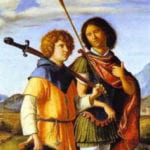 Our World
Our World  Our World
Our World  Pop Culture
Pop Culture 10 Incredible Female Comic Book Artists
 Crime
Crime 10 Terrifying Serial Killers from Centuries Ago
 Technology
Technology 10 Hilariously Over-Engineered Solutions to Simple Problems
 Miscellaneous
Miscellaneous 10 Ironic News Stories Straight out of an Alanis Morissette Song
 Politics
Politics 10 Lesser-Known Far-Right Groups of the 21st Century
 History
History Ten Revealing Facts about Daily Domestic Life in the Old West
 Weird Stuff
Weird Stuff 10 Everyday Products Surprisingly Made by Inmates
 Movies and TV
Movies and TV 10 Actors Dragged out of Retirement for One Key Role
 Creepy
Creepy 10 Lesser-Known Shapeshifter Legends from Around the World
 Our World
Our World 10 Science Facts That Will Change How You Look at the World
 Pop Culture
Pop Culture 10 Incredible Female Comic Book Artists
 Crime
Crime 10 Terrifying Serial Killers from Centuries Ago
Who's Behind Listverse?

Jamie Frater
Head Editor
Jamie founded Listverse due to an insatiable desire to share fascinating, obscure, and bizarre facts. He has been a guest speaker on numerous national radio and television stations and is a five time published author.
More About Us Technology
Technology 10 Hilariously Over-Engineered Solutions to Simple Problems
 Miscellaneous
Miscellaneous 10 Ironic News Stories Straight out of an Alanis Morissette Song
 Politics
Politics 10 Lesser-Known Far-Right Groups of the 21st Century
 History
History Ten Revealing Facts about Daily Domestic Life in the Old West
 Weird Stuff
Weird Stuff 10 Everyday Products Surprisingly Made by Inmates
 Movies and TV
Movies and TV 10 Actors Dragged out of Retirement for One Key Role
 Creepy
Creepy 10 Lesser-Known Shapeshifter Legends from Around the World
10 Gay Myths From Antiquity
Many people who only encounter the Greek and Roman myths as children never learn just how weird some of them are. In the versions told to young people, the gods can be capricious and cruel, but the darker aspects of their actions are often hidden. Zeus’s sexual conquests alone could fill a book with bizarre forms of assault.
Yet there is another aspect of the old myths and legends that is also often left out—their homosexual and transgender themes. The Greeks and Romans were a lot less squeamish about sex than we tend to be, and they celebrated it in all its forms. Here are ten myths from the ancient world with gay and trans stories to tell.
10 Karpos And Kalamos

In Nonnus of Panopolis’s epic poem the Dionysiaca is the sad tale of Karpos and Kalamos, two young boys in love. Kalamos was a handsome youth who lived by the river Meander—in fact, he was the son of the god who lived in the river. While Kalamos was quick and athletic, his friend Karpos was more attractive than any mortal. Together, the two would play and gambol along the riverbank. When they raced on land, Kalamos let Karpos win by pretending to stumble. When they had a swimming race, however, things went dreadfully wrong.[1]
Kalamos again held back so that his beloved could win. When a jealous wind drove a wave into Karpos’s mouth, he was washed under and drowned, leaving a heartbroken Kalamos to swim to shore and cry out for him. In anguish, he offered himself up as a sacrifice, saying, “I cannot see the light for one later dawn without Karpos. Karpos and Kalamos had one life, and both one watery death for both together in the same stream.”
Saying that, Kalamos dove into the water and drowned himself. Though he died, his body was transformed into reeds. Wherever reeds are found beside water, you will hear the sound of sighing as they brush against each other, and that is the sound of Kalamos lamenting his lost love.
9 Hyacinthus
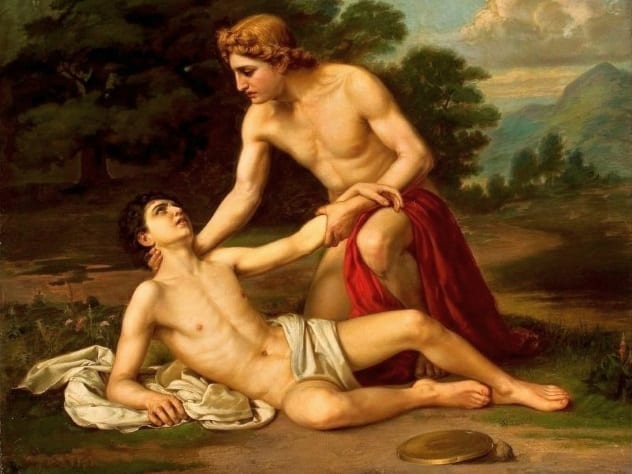
There are two versions of the death of the Greek hero Hyacinthus in myth, and both involve same-sex love.
In the first, the god Apollo falls in love with Hyacinthus, a prince of Sparta, because the boy is so handsome and quick. The two lovers, mortal and immortal, would often go hunting together in the mountains.[2] One day “when the youth and Apollo were well stripped, and gleaming with rich olive oil, they tried a friendly contest with the discus.” Apollo cast the discus up into the clouds, and Hyacinthus raced after it to show his speed. Instead of Hyacinthus catching it, the discus caught the boy full in the face and killed him. Apollo mourned his lover and commanded the hyacinth flower to grow in memory of him.
The second version of the myth tells the same story, but it is no mere accident that slays Hyacinthus. The West Wind, Zephyrus, was also a lover of the boy but had been spurned for Apollo. Unable to contain his anger at being rejected, the god of the wind blew Apollo’s discus at Hyacinthus. If he couldn’t have Hyacinthus, then no one could.
8 Tiresias
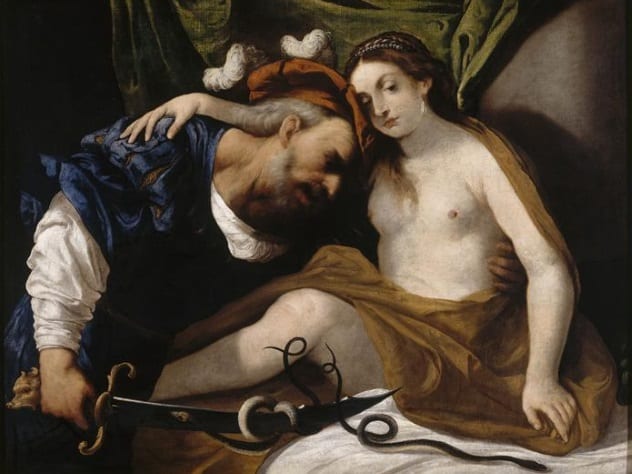
Tiresias is a figure who turns up in many Greek myths. According to legend, he was a skilled soothsayer who could predict the future with uncanny accuracy. In some stories, he was struck blind for his prophecies by the gods, who felt he was stepping on their territory, but there is another tradition.
One day while walking on Mount Cyllene, Tiresias came across two snakes mating. For whatever reason, he struck them with a stick. This upset Hera, queen of the gods, and she “punished” Tiresias by transforming him into a woman. Tiresias now went about her life as a woman—even marrying and having children.[3] Apparently untroubled by this gender-swap, Tiresias spent seven years as a woman before returning to the spot where he had injured the snakes to see if she could become a man again. Hera relented, and Tiresias underwent a second transformation.
Unfortunately, his time as a woman would cause Tiresias greater problems. One day, Zeus and Hera argued about whether women or men had more pleasure during sex. There was only one person who could say for sure, so they asked Tiresias. Tiresias said that women had ten times more fun during sex than men, which was not the answer Hera wanted, so she struck him blind. To make up for his lost eyesight, Zeus then gave Tiresias the gift of prophecy.
7 Eurybarus And Alcyoneus
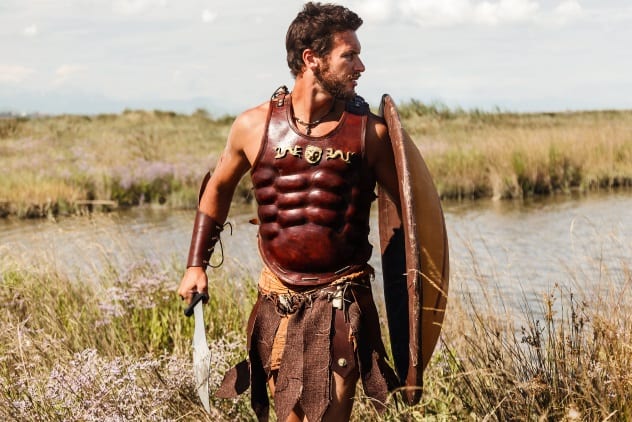
Once, there was a huge cave in Mount Cirphis that was home to a terrible monster known as Sybaris. Every day, the monster would emerge from the gloom to gobble up flocks of sheep and even the shepherds who guarded them. People were so afraid that they thought of abandoning their towns and moving elsewhere. Finally, they asked the oracle at Delphi how they could get rid of their tormentor. The oracle gave them only one solution—they must offer a human sacrifice.[4]
The person chosen was the beautiful and brave boy Alcyoneus. The priests of the town placed a garland of flowers on his head and led Alcyoneus toward his death. As luck, or the gods, would have it, however, just as they were leaving, Eurybarus happened by. He was so overcome with love for the handsome boy that he refused to let him be killed. Eurybarus grabbed the crown of flowers and put it on his own head, telling the priests to take him as a sacrifice instead.
When Eurybarus reached the cave of Sybaris, instead of being killed, he attacked the monster and cast her down the cliff to her death.
6 Achilles And Patroclus
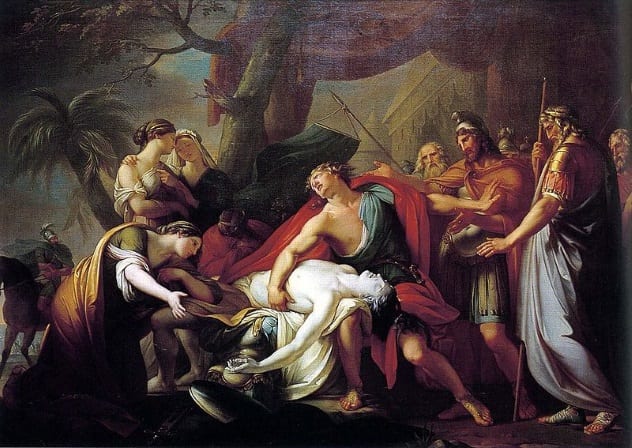
For thousands of years, people have been wondering just what went on in Achilles’s tent. In the Iliad, the poet Homer tells us of the love between Achilles and Patroclus but never explicitly shows them as romantic lovers—but that hasn’t stopped people from thinking there was more than friendship between the two. The ancient playwright Aeschylus apparently wrote a play called The Myrmidons, which showed the two as lovers. Unfortunately, not enough of the play survives to tell us how he envisioned their relationship.
From the Iliad, however we can see just how much Patroclus means to Achilles. During the siege of Troy, Achilles, the greatest of the Greek heroes, feels insulted, so he goes to his tent and sulks. During his absence from the battlefield, the war begins to turn against the Greeks. To put heart into the army, Patroclus puts on Achilles’s armor to make them think the latter is back among them. All goes to plan until the Trojan Hector kills Patroclus.[5]
Now Achilles does return to the fight. Nothing will stop his homicidal rage at the death of his “friend,” except the death of Hector. Achilles manages to kill him, lashes Hector’s corpse to his chariot, and drags it around the city of Troy. Back in the Greek camp, he throws elaborate funeral games for Patroclus. Sexual or not, love can make you do crazy things.
5 Narcissus
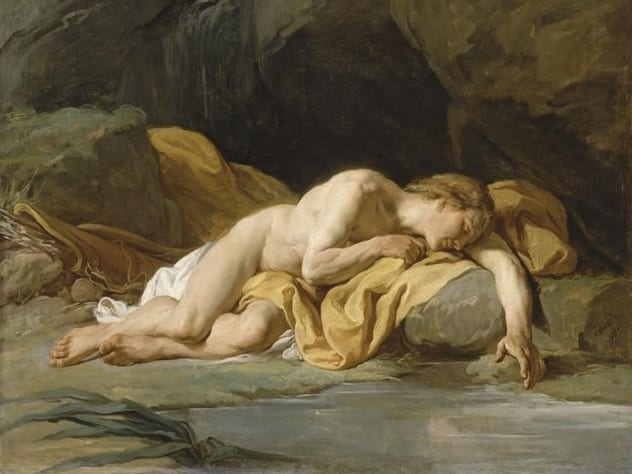
Many people have heard of the myth of Narcissus. Because he was so attractive, Narcissus was used to being lusted after by everyone, and this made him arrogant. In the most famous tale, he ignores the love of the nymph Echo, and she wastes away, leaving nothing but her voice, which can still be heard reflecting back whatever is said to her. Many people will also know that Narcissus fell so in love with his own reflection in a pool of water that he died of starvation, unable to tear himself away. But many will not know why this happened.
According to legend, one of the people who loved Narcissus was a man called Ameinias. Narcissus cruelly gave Ameinias a sword, with the clear hint that he should kill himself. Ameinias took the sword and plunged it into his chest on Narcissus’s doorstep—as well as calling down a curse on the proud young man.[6] Nemesis, goddess of revenge, heard his plea, and it was she who made Narcissus fall so suicidally in love with his own image.
4 Orpheus And Calais
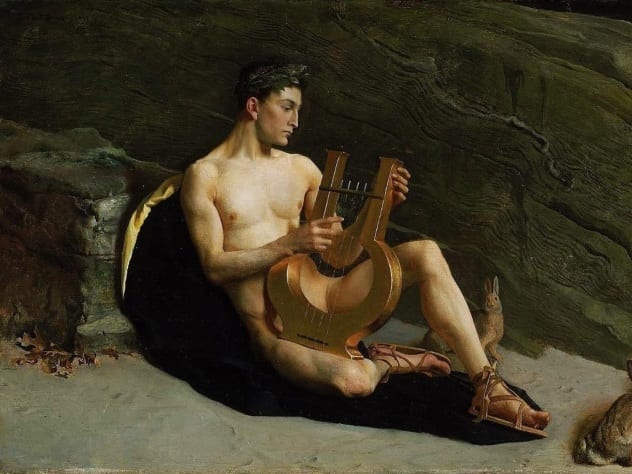
The most famous myth of Orpheus, the greatest of all singers, is a very straight one. When his wife Eurydice dies and goes to the underworld, Orpheus follows her to win her back. He is promised that she will walk just behind him as he leaves the underworld, but if he looks back even once, she will be returned to death. Unable to resist a little glance to be sure she is there, Orpheus loses his wife.
Other myths have Orpheus as one of the famous Argonauts who went in search of the Golden Fleece. The poet Phanocles tells us that while on the ship, Orpheus fell in love with Calais “the son of Boreas, with all his heart, and went often in shaded groves still singing of his desire, nor was his heart at rest. But always, sleepless cares wasted his spirits as he looked at fresh Calais.” Other ancient sources describe Orpheus as a hater of women and someone who seduced husbands away from their wives.[7]
Orpheus’s misogyny was apparently repaid in his death. When he refused to sing in honor of any god but Apollo, a group of female worshipers of Dionysus ripped the singer to pieces.
3 Heracles And Hylas
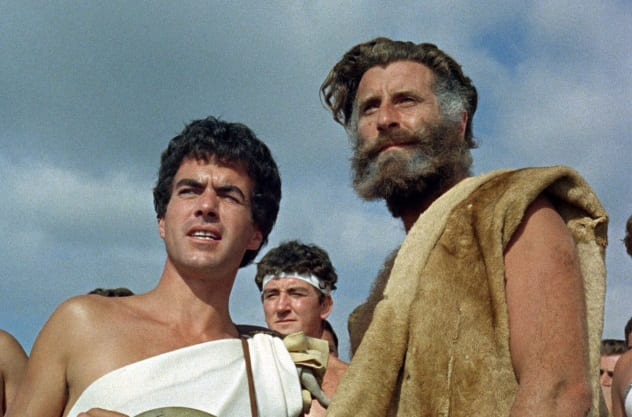
Heracles was quite the man. He once deflowered 49 out of 50 daughters of a king and impregnated all of his conquests. Yet there was another side to him. The ancient writer Plutarch tells us that his male lovers were beyond count. One lover, though, is worth particular mention—Hylas. One poet described how “even Amphitryon’s bronze-hearted son [Heracles], who defeated the savage Nemean lion, loved a boy—charming Hylas, whose hair hung down in curls. And like a father with a dear son he taught him all the things which had made him a mighty man, and famous.”
While on the adventure of the Argonauts, Heracles and Hylas became separated. While out collecting water at a spring, Hylas was seen by the nymphs who lived there. Falling in love with the beautiful youth, they decided they must have him.[8] They pulled him under, and Hylas was never seen again.
Heracles was unable to leave without Hylas, so the rest of the Argonauts carried on without the great Heracles. Whether Hylas was happier with the nymphs or Heracles is not recorded.
2 Ganymede
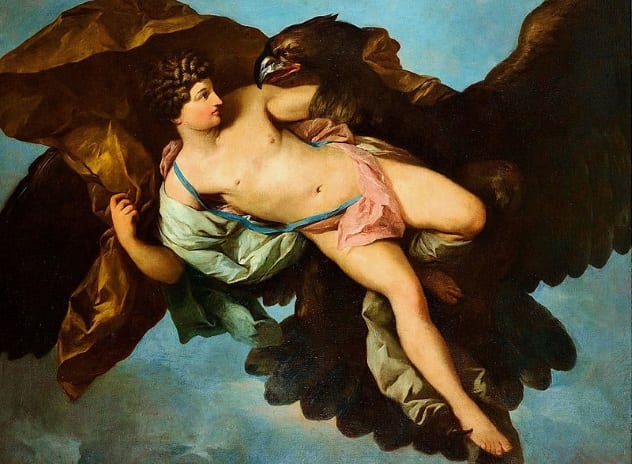
In many museums, there are strange classical statues of a boy looking fondly at an eagle. These are images of Ganymede and the god Zeus, in avian form. Even when other stories of the homosexual loves of the gods were suppressed or ignored, the story of Zeus and Ganymede remained popular. For gay men on the Grand Tour of Europe, images of Ganymede became a symbol they could display without too much shame.
According to myth, “Verily wise Zeus carried off golden-haired Ganymede because of his beauty, to be amongst the Deathless Ones and pour drink for the gods in the house of Zeus.”[9] Zeus did this because Ganymede was said to be extraordinarily attractive. But Zeus was not one to make his move in a normal way. Instead of simply offering Ganymede the chance for a date, he swept down on the young man while Ganymede was tending to his flock in the form of an eagle and hauled him up to heaven.
Given the role of cup-bearer to the gods, Ganymede became an immortal and was worshiped. When Ganymede’s father mourned the loss of his son, Zeus repaid the grieving father with some nice horses, which he was apparently very thankful for.
1 Callisto
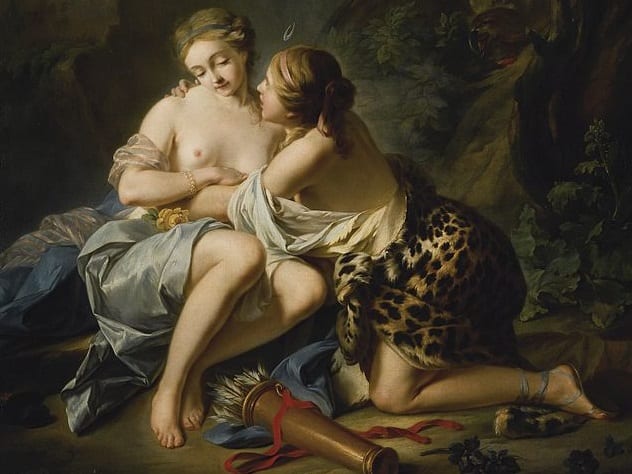
Artemis was known as one of the virgin goddesses. This hunting deity had no time for sexual relations, and she demanded equal purity in her followers. When Callisto joined the goddess’s company, she was sworn to virginity. It was not a promise that the overly sexed god Zeus would let her keep.
In some versions of the myth, Zeus approached Callisto while taking the form of Artemis. While still in the guise of a woman, Zeus seduced Callisto.[10] Even as a woman, Zeus was potent, so a pregnancy arose from the lesbian affair. This was not something that could be hidden, as the company of Artemis often bathed together. When Artemis saw one of her maidens was pregnant, she was outraged. “Why?” asked Callisto. It was Artemis’s child, Callisto thought. Callisto had her child and called him Arcas. For her impudence, Artemis turned Callisto into a bear and sent her away.
When Arcas grew up, he became a mighty hunter. One day, he saw a bear that did not try to flee from him or attack him. As it approached, he slew it. The bear was Callisto, and she had simply been trying to see her son. Zeus took pity on the woman he had wronged and placed her in the heavens as the constellation Ursa Major—the Great Bear.
Read more about Greek mythology on 10 Things You Didn’t Know About Greek Mythology and Top 10 Failed Seductions From Greek Mythology.

